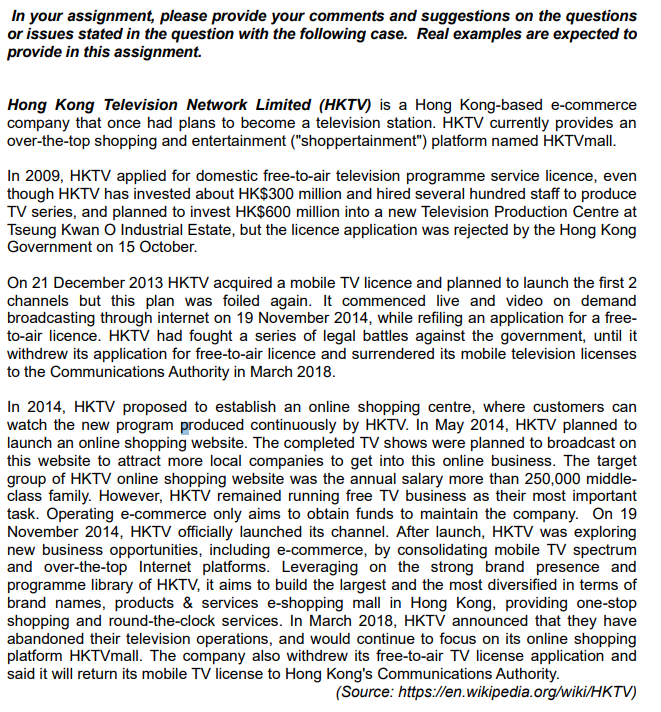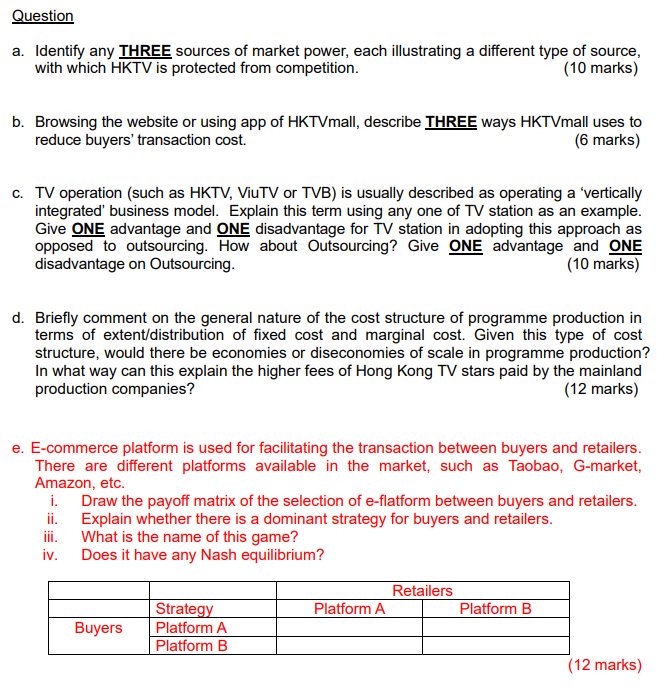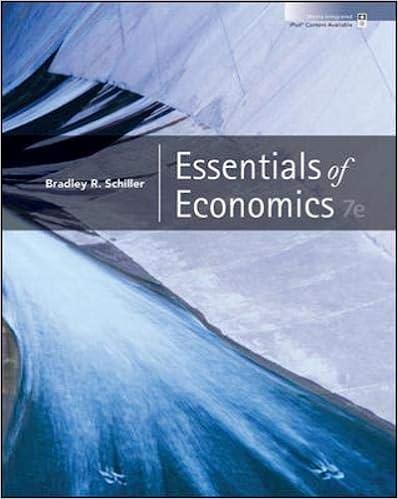In your assignment, please provide your comments and suggestions on the questions or issues stated in the question with the following case. Real examples are expected to provide in this assignment. Hong Kong Television Network Limited (HKTV) is a Hong Kong-based e-commerce company that once had plans to become a television station. HKTV currently provides an over-the-top shopping and entertainment ("shoppertainment") platform named HKTVmall. In 2009, HKTV applied for domestic free-to-air television programme service licence, even though HKTV has invested about HK$300 million and hired several hundred staff to produce TV series, and planned to invest HK$600 million into a new Television Production Centre at Tseung Kwan O Industrial Estate, but the licence application was rejected by the Hong Kong Government on 15 October. On 21 December 2013 HKTV acquired a mobile TV licence and planned to launch the first 2 channels but this plan was foiled again. It commenced live and video on demand broadcasting through internet on 19 November 2014, while refiling an application for a free- to-air licence. HKTV had fought a series of legal battles against the government, until it withdrew its application for free-to-air licence and surrendered its mobile television licenses to the Communications Authority in March 2018. In 2014, HKTV proposed to establish an online shopping centre, where customers can watch the new program produced continuously by HKTV. In May 2014, HKTV planned to launch an online shopping website. The completed TV shows were planned to broadcast on this website to attract more local companies to get into this online business. The target group of HKTV online shopping website was the annual salary more than 250,000 middle- class family. However, HKTV remained running free TV business as their most important task. Operating e-commerce only aims to obtain funds to maintain the company. On 19 November 2014, HKTV officially launched its channel. After launch, HKTV was exploring new business opportunities, including e-commerce, by consolidating mobile TV spectrum and over-the-top Internet platforms. Leveraging on the strong brand presence and programme library of HKTV, it aims to build the largest and the most diversified in terms of brand names, products & services e-shopping mall in Hong Kong, providing one-stop shopping and round-the-clock services. In March 2018, HKTV announced that they have abandoned their television operations, and would continue to focus on its online shopping platform HKTVmall. The company also withdrew its free-to-air TV license application and said it will return its mobile TV license to Hong Kong's Communications Authority. (Source: https://en.wikipedia.org/wiki/HKTV)Question a. Identify any THREE sources of market power, each illustrating a different type of source, with which HKTV is protected from competition. (10 marks) b. Browsing the website or using app of HKTVmall, describe THREE ways HKTVmall uses to reduce buyers' transaction cost. (6 marks) c. TV operation (such as HKTV, ViuTV or TVB) is usually described as operating a 'vertically integrated' business model. Explain this term using any one of TV station as an example. Give ONE advantage and ONE disadvantage for TV station in adopting this approach as opposed to outsourcing. How about Outsourcing? Give ONE advantage and ONE disadvantage on Outsourcing. (10 marks) d. Briefly comment on the general nature of the cost structure of programme production in terms of extent/distribution of fixed cost and marginal cost. Given this type of cost structure, would there be economies or diseconomies of scale in programme production? In what way can this explain the higher fees of Hong Kong TV stars paid by the mainland production companies? (12 marks) e. E-commerce platform is used for facilitating the transaction between buyers and retailers. There are different platforms available in the market, such as Taobao, G-market, Amazon, etc. i. Draw the payoff matrix of the selection of e-flatform between buyers and retailers. ii. Explain whether there is a dominant strategy for buyers and retailers. iii. What is the name of this game? iv. Does it have any Nash equilibrium? Retailers Strategy Platform A Platform B Buyers Platform A Platform B (12 marks)








